Luca Badetti, PhD joins IPS as Adjunct Assistant Professor
April 18, 2018
Dr. Luca Badetti has just joined the IPS community as an Adjunct Assistant Professor. He will be part of the Pastoral Counseling program and will teach two Fall 2018 classes: “Research Methods” and “Foundations of Pastoral Care”.
Dr. Badetti was born in Rome, did middle school in Milan, and then moved to the United States. He obtained a master’s in Clinical Psychology from the Institute for the Psychological Sciences at Divine Mercy University and a doctorate in Disability Studies from the University of Illinois at Chicago (UIC), writing his dissertation on “Self-Determination and Community Life in Persons with Intellectual Disabilities”.
VoyageChicago recently published a detailed profile on Dr. Badetti, highlighting among other things his current work as the Community Life Director at L’Arche Chicago, “a multi-cultural faith community on the west side comprised of three homes in which people with and without intellectual disabilities live together ordinary life (sharing meals, going on outings, praying together, etc.).” In this role, Luca supports community life across its different layers: hiring and training assistants/staff, leading team meetings, events and retreats, accompanying, listening and walking with people as they grow through their community journey.”
We would like to share below Dr. Badetti’s responses to a few questions we recently posed to him:
Why IPS? What drew you to this program?
I have come to believe that life reveals itself to us as we journey along – it can surprise us and lead us, sometimes in very unexpected ways. This is true across its different domains, even the academic and professional one.
I didn’t plan to find Loyola University’s Institute for Pastoral Studies but I found it, and it found me.
To give a bit of background, during my undergraduate studies I wanted to study the human person in a holistic way, and one discipline was not enough to do so! I therefore double majored and double minored, seeking to bring together theology, philosophy and psychology.
I obtained a master’s in clinical psychology from a graduate institute of the psychological sciences (its abbreviated name was IPS too!), which sought to combine psychology with theology.
I then continued my own reflection on integration, which continues to this day. This reflection also informs and has been informed by my community leadership and pastoral experience in L’Arche, a movement of faith communities in which people with and without intellectual disabilities share life together in a spirit of belonging. I currently am the Director of Community Life in our Chicago community, which I became a part of once I moved to the city about eight years ago for my doctorate in Disability Studies.
I was already interested in IPS when I found out about it years ago, having known some of its students but also one of its founders. Considering my background, here it was…an institute that sought to combine psychological and theological insights for the accompaniment of people! How could I not be interested?
IPS then found me, inviting me to teach as one of its adjunct professors.
How do you feel about joining IPS?
I am honored and pleased.
I just mentioned a bit about my academic/community background…I find so many connections between it and the focus of IPS. I am glad to now be part of the IPS team.
Coming originally from Rome and currently living in Chicago, I also find quite exciting that IPS has a presence in both Chicago and Rome. Yet another connection!
What are your expectations about being part of the IPS family?
I am ready to be surprised!
Expectations, on the other hand, can be tricky, precisely because of what I was mentioning before about life revealing itself. Expectations can be like little boxes in our heads, while life is so much bigger than them. But, yes, I am open to being surprised.
Finally, can you share a personal spiritual practice that continues to restore and re-energize your mind, body, heart and spirit?
I believe there is a deep core to spirituality, beyond words, that is very intimate, mysterious and profound. Like other intimate realities, it should be protected and not exposed.
There is also a level in spirituality that is personal while also being communal and social, from which one can share with others using words and from which I am drawing my reply to your question.
Instead of using the concept of a practice I do, I’d like to speak of a reality I like to enter into – and also nurture: leisure.
What in Italy is called the “dolce far niente” (the sweet doing nothing) is a beautiful being present. Whether sharing coffee with a friend, listening to music, enjoying good food, sitting quietly, strolling around and so forth, leisure can be a delightfully human, and therefore profoundly spiritual, experience. That primacy of being over doing.
For more on Dr. Luca Badetti, go to https://www.lucabadetti.com/.
(Image credits: Sally O’Donnell Photography, Roberta Dupuis- Devlin)
###############################################



